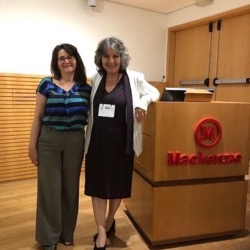Watch this entire presentation

Subscribe to Rosanne’s Channel and receive notice of each new video!
Transcript:
Some critics at the time even said they only did it because often a movie would have two or three writers and only one director and it was easier to use the director’s name. It didn’t really mean they thought he was the only one who’d done any work but it became the way we thought but also this leads to the great man version of filmmaking because mostly directors were men. So we could begin to say these geniuses who had created films for us — the Alfred Hitchcocks of the world — and we forget to mention Joan Harrison who is the female who wrote half of his movies including um one of them that won an Oscar whose name just escaped me, so this great man theory is no good. Also in America Peter Bogdanovich is a director and he wrote this book in 1997, which is about legendary directors. Even though Peter Bogdanovich was a writer/director. He privileged the directors in the history that he wrote about Hollywood. So this is crazy.
A Note About This Presentation
A clip from my keynote speech at the 10th Screenwriters´(hi)Stories Seminar for the interdisciplinary Graduation Program in “Education, Art, and History of Culture”, in Mackenzie Presbyterian University, at São Paulo, SP, Brazil, focused on the topic “Why Researching Screenwriters (has Always) Mattered.” I was especially pleased with the passion these young scholars have toward screenwriting and it’s importance in transmitting culture across the man-made borders of our world.
To understand the world we have to understand its stories and to understand the world’s stories we must understand the world’s storytellers. A century ago and longer those people would have been the novelists of any particular country but since the invention of film, the storytellers who reach the most people with their ideas and their lessons have been the screenwriters. My teaching philosophy is that: Words matter, Writers matter, and Women writers matte, r so women writers are my focus because they have been the far less researched and yet they are over half the population. We cannot tell the stories of the people until we know what stories the mothers have passed down to their children. Those are the stories that last. Now is the time to research screenwriters of all cultures and the stories they tell because people are finally recognizing the work of writers and appreciating how their favorite stories took shape on the page long before they were cast, or filmed, or edited. But also because streaming services make the stories of many cultures now available to a much wider world than ever before.
Many thanks to Glaucia Davino for the invitation.
* A portion of each sale from Amazon.com directly supports our blogs
** Many of these books may be available from your local library. Check it out!
† Available from the LA Public Library
Podcast: Play in new window | Download
Subscribe: RSS
![21 Truffaut and The Auteur Theory from Why Researching Screenwriters (has Always) Mattered [Video] (56 seconds)](https://rosannewelch.com/wp-content/uploads/2020/08/rmw-sao-paolo-21.jpeg)
![20 Ruth Gordon & Garson Kanin from Why Researching Screenwriters (has Always) Mattered [Video ] (53 seconds)](https://rosannewelch.com/wp-content/uploads/2020/07/rmw-sao-paolo-20.jpeg)
![19 Nunnally Johnson and John Ford from Why Researching Screenwriters (has Always) Mattered [Video] (51 seconds)](https://rosannewelch.com/wp-content/uploads/2020/07/rmw-sao-paolo-19.jpeg)
![18 Nunnally Johnson and The Grapes Of Wrath from Why Researching Screenwriters (has Always) Mattered [Video] (1 minute 11 seconds)](https://rosannewelch.com/wp-content/uploads/2020/07/rmw-sao-paolo-18.jpeg)
![17 Albert Hackett & Frances Goodrich from Why Researching Screenwriters (has Always) Mattered [Video] (1 minute)](https://rosannewelch.com/wp-content/uploads/2020/07/rmw-sao-paolo-17.jpeg)
![16 Robert Riskin from Why Researching Screenwriters (has Always) Mattered [Video] (1 minute)](https://rosannewelch.com/wp-content/uploads/2020/06/rmw-sao-paolo-16.jpeg)
![15 More On Charlie Brackett from Why Researching Screenwriters (has Always) Mattered [Video] (57 seconds)](https://rosannewelch.com/wp-content/uploads/2020/06/rmw-sao-paolo-15.jpeg)






![14 Charlie Brackett from Why Researching Screenwriters (has Always) Mattered [Video] (54 seconds)](https://rosannewelch.com/wp-content/uploads/2020/06/rmw-sao-paolo-14.jpeg)